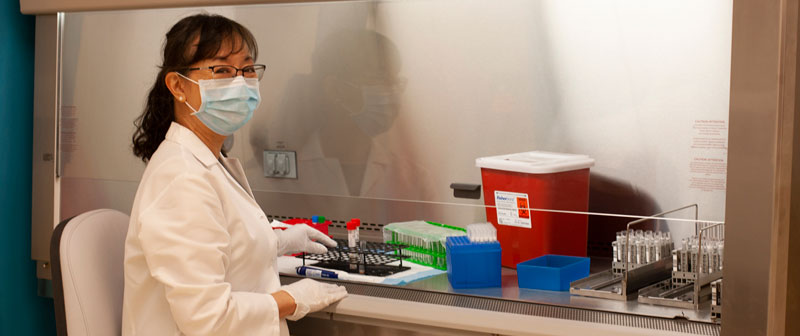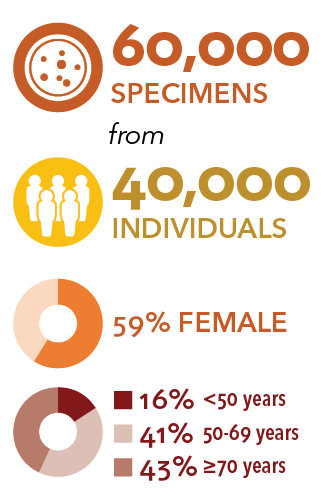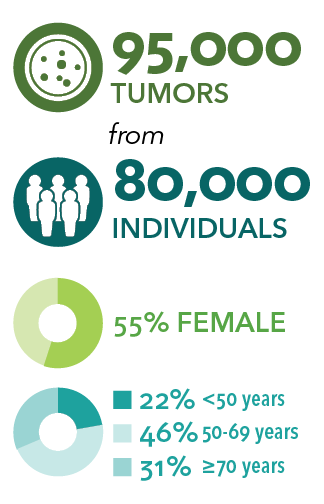
Specimens linked to electronic health records include research participants tested for COVID-19
The Center for Health Research (CHR) at Kaiser Permanente Northwest provides researchers access to a unique collection of blood and tissue specimens for use in research studies—the KPNW Biorepository. The biospecimens are linked to rich electronic health record and survey data from research participants who are KPNW health plan members. The available data are extensive and include diagnosis, clinical encounter, pharmacy, and laboratory data as well as existing genomic data for some participants and tumor registry data for participants with cancer. Specimens and their associated data, including specimens and data from research participants who now have tested positive or negative for COVID-19, are available for approved research projects undertaken in collaboration with CHR investigators.
Blood-Based Specimens
 Descriptive characteristics of the blood-based specimens
Descriptive characteristics of the blood-based specimens
To create our blood-based DNA repository, we recruited patients with specific health conditions including diabetes (more than 5,000 people), cardiovascular disease (more than 3,000 people), cancer of the breast, prostate, and lung (more than 2,800 people), and clinical depression (more than 1,000 people). Our collection also includes specimens from individuals without a specific disease who volunteered to be part of this DNA repository (more than 2,000 people). Blood-based specimens include plasma, DNA extracted from whole blood, and buffy coat that can be used to obtain genomic data.
Tissue Specimens
 Descriptive characteristics of the tumor specimens
Descriptive characteristics of the tumor specimens
The KPNW Biorepository also allows researchers access to a vast library of tissue specimens originally collected for clinical purposes. The library includes more than 3.5 million individual Formalin-Fixed Paraffin-Embedded (FFPE) normal and tumor tissue blocks dating back to 1971. Tissue blocks can be sectioned to meet thickness, slide type, and staining requirements, and DNA and RNA can be extracted. Other types of specimens include pap smears and cervicovaginal lavages. These samples are linked to the KPNW centralized tumor registry of all cancer patients diagnosed since 1960. This registry tracks a patient’s entire course of care after a cancer diagnosis and uses active surveillance throughout the individual’s lifespan to provide up-to-date recurrence and survival data. Of the more than 95,000 tumors in the library, tissue is available for more than 15,000 breast, 10,000 prostate, 7,500 cervical, 7,500 colon and rectum, 6,000 lung, and 6,000 urinary system cancer patients.
Previous studies have used KPNW Biorepository specimens and data to investigate:
- The population prevalence of hereditary hemochromatosis
- Pharmacogenetics of CYP2C19 and proton pump inhibitor use
- Molecular and genetic factors associated with disease incidence and progression
- Disease detection, prevention, and treatment
- Response to tamoxifen in breast cancer treatment
- Genetic risk factors for aggressive prostate cancer
About KPNW Members
Kaiser Permanente Northwest provides medical insurance and care to more than 600,000 members and dental insurance and care to about 280,000 members in northwest Oregon and southwest Washington. KPNW’s members are ethnically representative of the surrounding community and make up about 24% of the area’s population. Retention is high among KPNW members. In 2017, annual retention rates were 91.4% for medical members and 90.2% for dental members. Strong member retention, combined with the rich data captured in KPNW’s electronic health records that allows researchers to follow members over time, provide an ideal research setting.
Interested in learning more?
If you are interested in collaborating with CHR researchers or learning more about our biospecimen and data resources, please visit our website and/or contact the ABC Administrator.